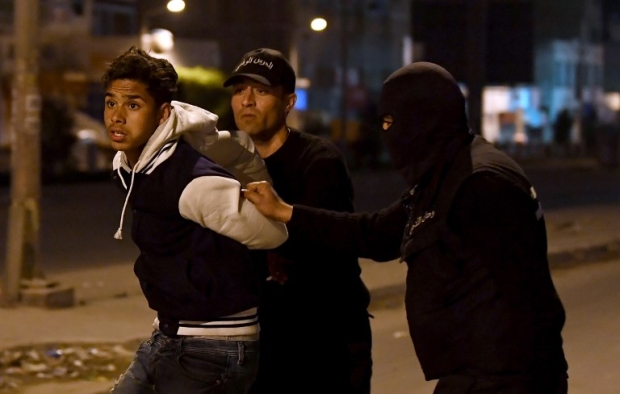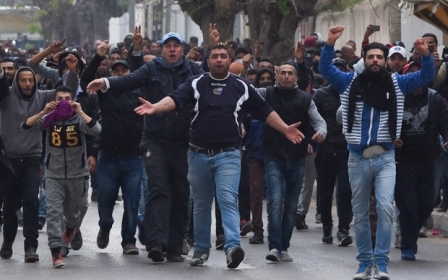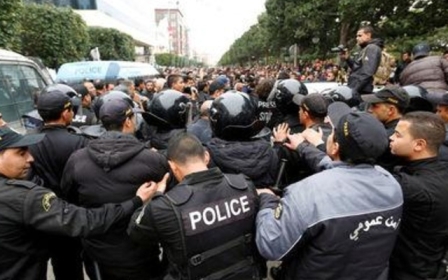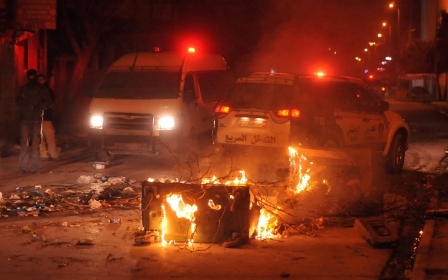Hundreds protest in Tunis, as nearly 800 detained by authorities
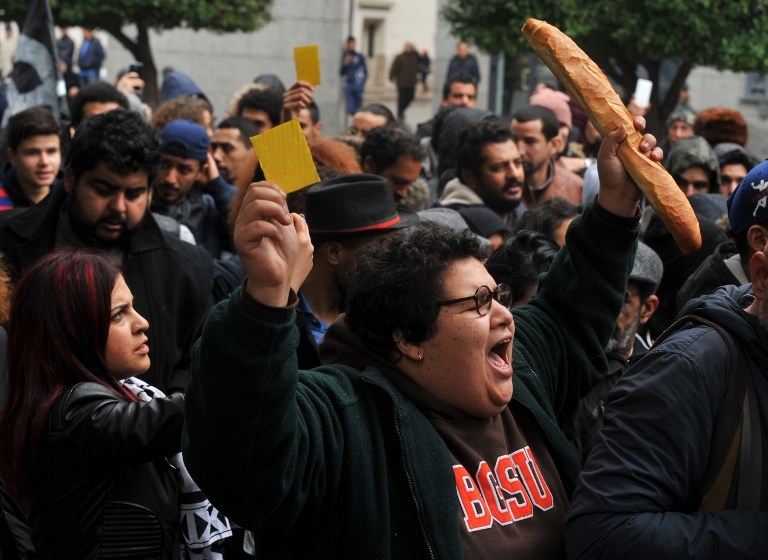
Hundreds of protesters gathered in Tunis on Friday, as authorities announced they have detained nearly 800 people over the growing wave of dissent.
Protests, some violent, flared across Tunisia on Monday, when one protester was killed, before ebbing on Thursday. Protesters have burned dozens of state buildings, prompting the government to send the army into several cities and towns.
On Friday in Tunis, protesters voiced their disapproval of the new budget.
“We came here today to demonstrate against the budget law of 2018, a law that has raised prices,” Sara, a 28-year-old graduate student of economics, told MEE.
'If the government continues with this policy and continues to implement the stipulations of the IMF, we will continue our protests'
- Warda Atig, co-founder of Fech Netannew movement
“The people who are governing today, the governing coalition, are involved in corruption and don’t want to fight corruption,” she added.
“They pretend they are fighting corruption but it’s the opposite, they are covering it up. Today we’re demonstrating to eventually bring down the budget law and realise the goals of the revolution the people fought for in 2011.”
Warda Atig is one of the founders and spokespeople for the Fech Netannew – What Are We Waiting For? – campaign, which had organised Friday’s protests.
IMF policies
“The budget law is the result of liberal policies. For sure if the government continues with this policy and continues to implement the stipulations of the IMF, we will continue our protests against the choices of the government,” she said.
Last year, the Washington-based IMF agreed a four-year loan programme worth about $2.8bn with Tunisia, but tied to economic reforms.
The 2018 budget also raises customs taxes on some imports, and the Tunis government is trying to cut the public sector wage bill through voluntary redundancies.
“The government is producing a policy that is neither nationalistic nor popular,” Atig added.
Activists have also called for fresh demonstrations on Sunday, the seventh anniversary of the toppling of authoritarian president Zine El-Abidine Ben Ali.
In Sidi Bouzid – the city in which those initial protests began – protesters on Friday were demanding jobs.
"We had hoped that our lives would become better, that we get jobs and housing, but everything has turned for the worse," said Bashir Hussein, one of the disgruntled graduates.
He is embarrassed that at 32 he still lives at home, unable to find a good job since graduation a decade ago - a fate shared by many in a country where unemployment among the young runs around 30 percent. "I cannot afford to marry. I don't have hopes anymore that things will improve," Hussein said.
A spokesperson at the interior ministry said that protests are dying out.
“The protests have declined and there was no damage, but last night the police arrested 150 people involved in rioting in the past few days, bringing the total number of detainees to 778,” interior ministry spokesman Khelifa Chibani said. Sixteen “Islamist extremists” were among those detained, he said.
"We're concerned about the high number of arrests, some 778 people we understand have now been arrested since Monday, and around a third of those arrested were between the ages of 15 and 20 so very young," UN human rights spokesman Rupert Colville told reporters in Geneva.
"We call on the authorities to ensure that people are not arrested in an arbitrary manner and that all those detained are treated with full respect for their due process rights and are either charged or promptly released," he said.
Three local leaders of the Popular Front, the main opposition bloc, were detained in Gafsa for allegedly setting fire to a government building, a judicial source said.
The Popular Front said its leaders had been targeted in a political campaign that was “reproducing the methods of the oppressive Ben Ali regime”. Party members had also been arrested in Mahdia and Karbariya, it said.
The protests draw on anger over price and tax increases included in this year’s budget that took effect on 1 January.
The government has blamed the opposition and “troublemakers” for stoking unrest, a charge the opposition has denied. The government has vowed not to back down on the austerity measures, taken to satisfy foreign lenders.
Prices have increased for fuel and some consumer goods, while taxes on cars, phone calls, the internet, hotel accommodation and other items have also gone up.
Tunisia appears to have little scope to back away austerity. The International Monetary Fund (IMF) says Tunisia is committed to “decisive action” to reform its economy before the IMF reviews the payment of its next loan tranche.
While Tunisia is held up by some as the only democratic success story among countries swept up in the "Arab Spring", it has had nine governments since Ben Ali’s overthrow, none of which have been able to resolve deep-rooted economic problems.
- Additional reporting by Fadil Aliriza
New MEE newsletter: Jerusalem Dispatch
Sign up to get the latest insights and analysis on Israel-Palestine, alongside Turkey Unpacked and other MEE newsletters
Middle East Eye delivers independent and unrivalled coverage and analysis of the Middle East, North Africa and beyond. To learn more about republishing this content and the associated fees, please fill out this form. More about MEE can be found here.


